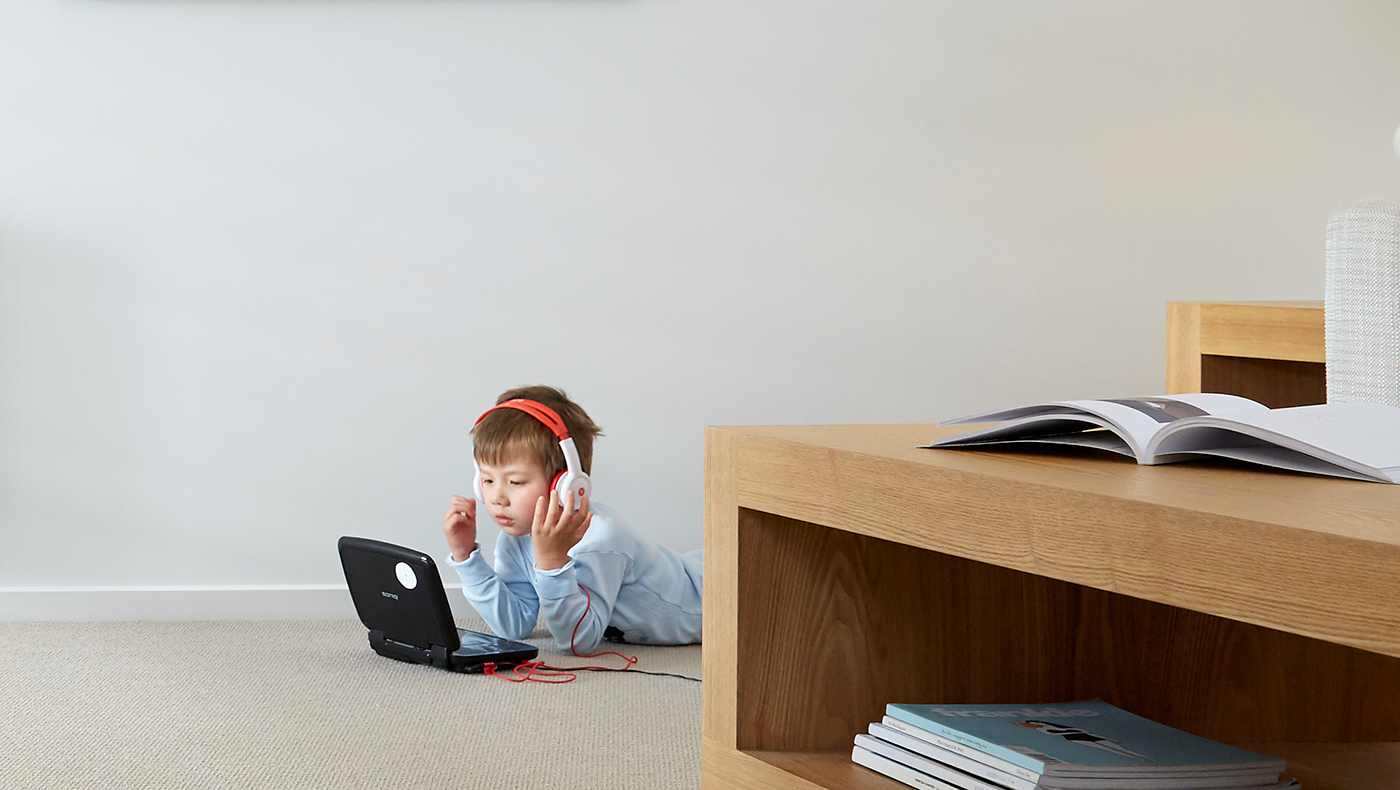The noise factor: why it’s important both indoors and out

When we think about air conditioners, the main issues that spring to mind are comfort levels and running cost. However, there is one other factor that can drastically affect the comfort of an air-conditioned environment: noise. Let’s not forget that beneath the surface, an air conditioner is working hard to function – and it’s difficult for any machine to do this in complete silence. However, there are some things you can do to keep your air con noise to a minimum (and trust us, both your family and your neighbours will thank you for it).
Tip 1: Don’t forget to read the specifications
While it’s pretty hard to ‘try before you buy’, you can still find out about a unit’s noise levels without having to drag it home. Noise level are measured in decibels (dB) and should be included in the product specifications (if not, ask a dealer). There will generally be two numbers: one that refers to the noise that a unit makes inside the home, and the other that refers to exterior noise.
When it comes to interior noise, these days it’s reasonable for some new split system air conditioners to be no louder than 35 dB (depending on unit capacity). To put this in context, 20 dB is the equivalent of a whisper (some Daikin split systems rate at 19 dB), and 40 dB is equal to the ambient background noise you’d hear in a park or residential area. And when it comes to exterior noise, obviously the quieter your unit is, the better (generally no louder than 5 dB above the usual ambient noise in your area).
Tip 2: Newer units trump older models thanks to improved technology
When it comes to both indoor and outdoor noise, the noise generated will largely depend on the age, model and make of your unit. Generally speaking, older air conditioners can be noisier than newer ones, and window units tend to be louder than ducted or split systems. That said, the noise factor is also heavily dependent on how the unit has been made – something that isn’t always easy to judge when you’re shopping around for a unit.
Fortunately, Daikin has invested significantly in research and development to ensure that cutting edge technology is incorporated in the design of our air conditioners to minimise noise. These technologies include aerodynamic fan blades on both the indoor split system and its outdoor unit, specifically designed air grilles on the outdoor unit, and the latest innovations in compressor technology to ensure it operates efficiently and quietly. The ‘Quiet Operations’ function in Daikin’s split systems makes it a particularly good prospect for areas of the home that need to be that extra bit quieter, such as studies or babies’ rooms.
Tip 3: Consider placement carefully
When installing an air conditioning system, it pays to think carefully about where it will go – especially on the outside of your house. While you generally won’t need Council’s approval to install a unit for your home, Council will have guidelines around the amount of noise that’s acceptable in your local residential area. If you’re in a strata-managed unit, it’s likely you’ll need approval from the Owners’ Corporation (check your by-laws for details).
Unsure of the best place to put your outdoor unit? Don’t stress - Daikin Specialist Dealers are available for an in-home assessment and will make a recommendation based on your specific requirements and environment. They’ll also be able to point out things to consider like putting the outdoor unit as far away from your neighbours’ windows and bedrooms as possible, and whether any additional solutions are required to keep noise levels down.
Tip 4: Keep an ear out for unusual sounds
When you’ve had a unit for a while you’ll know what level and type of noise is normal, and you’ll probably tune it out completely. Keep an ear out though – because if your unit starts making more noise, or a different kind of noise, it could indicate that there’s a problem with how it’s running. Here are a few common ones:
Rattling: this may mean your fan rotor is loose. The unit should be stopped and a call-out should be made to a licensed technician for a service check.
Humming if this gets louder than usual there may be a build-up of dust and debris inside the unit. If it’s really loud, humming could indicate that your starting capacitor is failing, which is a more serious problem.
Squeaking: often, this means your units needs cleaning, or some extra lubrication.
Grinding: this is something to be a bit more concerned about, as it could mean that something is about to go seriously wrong – like an essential bearing failing, or a dual shaft motor breaking down. Definitely not something to ignore.
Hissing: probably the most worrying noise of all, hissing can either signify a minor issue (like an air return leak) or a very major one: namely, that the unit is leaking refrigerant. In this event it’s essential to call a specialist dealer as soon as possible.
Tip 5: Regular servicing will keep noise to a minimum
Most of the problems we’ve mentioned above can be avoided by ensuring you regularly service your air conditioner, and keep your filters fresh (our handy article explains when and how). Of course, it also helps to invest in the right unit to begin with – if you’d like any advice, don’t hesitate to get in touch with your local Daikin Dealer.
